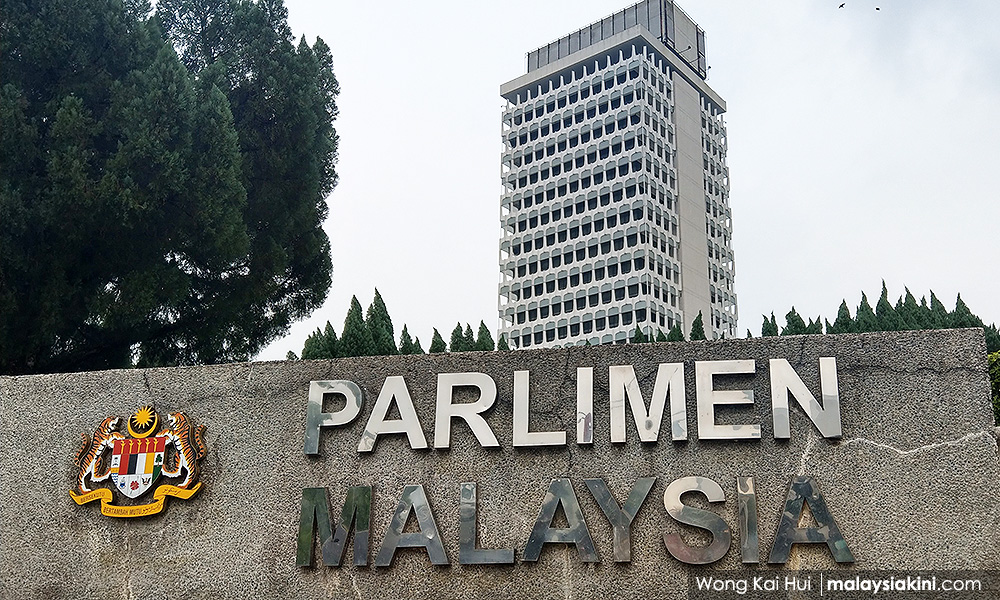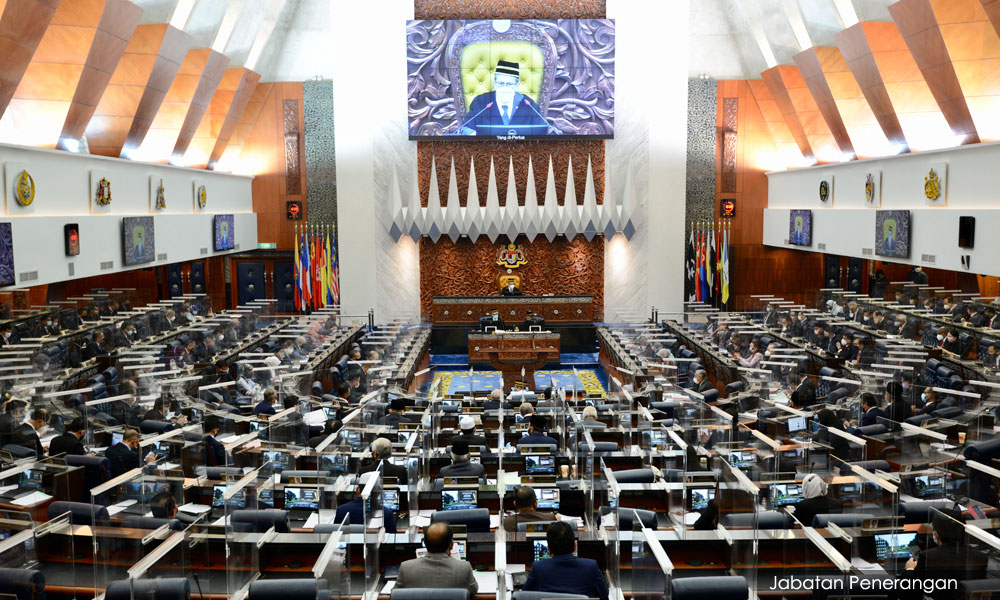COMMENT | Dr Nizamuddin Alias from UPSI has written a nice piece of opinion regarding the significance of a vote of no confidence in a parliamentary democracy like Malaysia.
So this lesser piece of opinion seeks to be aligned to his well-argued and well-thought-out article.
Firstly, by now in August 2021, it should be clear to anyone, especially reasonable persons, that the Yang di-Pertuan Agong as a constitutional monarch does not have powers similar to a monarch.
This is because Article 40 of the Federal Constitution and the historical documents of the Reid Commission Report, the White Paper on Constitutional Proposals together with all the treaties signed by the Malay rulers with the British government pre-dating the Federal Constitution have limited the powers of the Malay rulers.
There is no shame in admitting this, neither is it a crime to merely state this legal fact.
However, we still have some people in Malaysia who either expressly or impliedly parrot out the fiction that the powers of the Agong are akin to the powers of a Malay sultan prior to British colonialism.
In fact, some of these people go further to assert strangely that British colonialism did not clip the powers of the Malay rulers.
This is despite the fact that renowned and honest academics have pointed out time and again that the so-called distinction between a colony and a protectorate under British colonialism was just a myth.
It is a myth because in the practical sense, during such time, it was the British government, and not the Malay sultans, who had real powers and command.
The Agong’s discretion isn’t unfettered, including when appointing PM
Time and again this advice on the mythology of the powers of the Malay rulers had been ignored and silenced. This is seen in the context of the appointment of the prime minister.
Does the Agong have absolute powers in appointing the prime minister? Could the Agong appoint any person as the prime minister?
Of course, as a constitutional monarch, the Agong does not have absolute powers in this matter. Yes, the Agong has discretion, but that discretion is not an unfettered discretion.

The person to be appointed as the prime minister must be a person “likely to command the confidence of the majority”. This is later to be seen in the mechanics of the Dewan Rakyat, in which the majority support must be able to be demonstrated at all relevant times.
Therefore, the appointment by the Agong is not exhaustive, nor is it the “be-all” and “end-all” regarding the position of the prime minister.
The majority support could be challenged in the legislative assembly and the Dewan Rakyat. It needs to be proven, when and where there is a reasonable inference that the prime minister does not enjoy or no longer enjoys the support of the majority members of the assembly.
“But the motion of confidence is not stated in the Federal Constitution.” This is the confident argument exclaimed by some, who then used some past judicial decisions to argue that the support of the majority could be verified and demonstrated outside of the legislative assembly with the use of statutory declarations.
With respect to that opinion, one needs to look at the history of the Parliament in which it has been bequeathed to us by the British colonial government.
Other than looking at the Federal Constitution and the Standing Rules of the Dewan Rakyat, a person with solid reasoning capacity must also look at the conventions of Parliament, not just in the UK but also in other Westminster parliamentary democracies like India, Australia, New Zealand and Canada.
Having looked at all these, then certainly it is “beyond intelligible comprehension” (with thanks to the late Eusoffee Abdoolcader) how and why some people continue to deny the priority of the majority support to be demonstrated in the Dewan Rakyat via a motion of confidence.

Parliament is certainly the highest venue of politics and it is apt that the majority support as claimed to be enjoyed by the prime minister must be proven publicly in Parliament in the name of accountability to the people. This is because it is the nature of what members of parliament are: representatives and servants of the people.
To deny the working and the passage of a motion of confidence in Dewan Rakyat merely on the excuse that “statutory declarations could also be used for the same purpose” reeks of political opportunism.
The dangers of nativism
There are, of course, some who like to champion the local nature of the legal institutions. They say one must be careful, and not cavalierly import foreign elements and impose them upon our own local institutions.
There is nothing new nor revolutionary about this view. Generations of law students had read Savigny’s “volkgeist” or Choudhury’s “Migration of Constitutional Ideas” as to how the law is organic and originates from the local people/community.
By employing this argument, there seems to be a light and almost imperceptible suggestion that we be governed by the norms of the ancient Malay court system, during which decisions were made by the nobles.
This is where proponents of this belief are seriously mistaken in their worldview for failing to take note of the danger of the extreme position of “nativism”.
None of our legal institutions stand on their own, none of them were created in a vacuum and they are also products of global and international mechanisms.
While some of our legal institutions might have been created organically by and from the local community a very, very long time ago, the passage of time has moulded them to be somewhat in conformity with the practices of the international community. Our Parliament certainly proves this point.
Also, any reasonable person studying local adat and native legal systems must also address the problem of how resorting to nativity on the reason of cultural purity would be accompanied with massive problems.
This was demonstrated by the “National Socialism” in Germany during the Second World War that had stretched Savigny’s “volkgeist” a tad too far.
Misrepresentation of ruler's position
So, what do we need to do? We need an honest and holistic look at our “history” and this is important since law cannot be divorced from history. But while law is tightly connected to history, it would be dangerous to merely pander to the past since, like all things, law could and does change with time.
There seems to be a trend among certain groups of constitutional and historical experts to continually harp on the powers of the Malay rulers in the past. With that, they also continue to present a one-sided version of history.
Until today, there is no serious intention among them to address the historical nature of feudalism in our society. Serious scholarly works by the late Professor Syed Hussein Alattas and his disciples have been actively silenced by these groups.
We need to seriously examine the entire history of British colonialism and, in this endeavour, one must be careful not to merely blame the Malay rulers since the roles played by the Malay nobles must also be scrutinised.
Instead of doing this serious examination, more effort has been spent merely focusing on the powers of the rulers and leaving out analysis of the unequal power relations between the British colonial authority, Malay rulers, Malay nobles and Malay subaltern.
There is a deafening silence regarding other major constitutional events in the past. This includes how locals demonstrated showing their dissatisfaction towards the Malayan Union in 1948. There is also a lack of discussion as to how and why the powers of the Malay rulers were whittled down via constitutional amendments in 1983 and 1993.
While these constitutional events might be called “constitutional moments” by Ackerman, one must concede that the process of constitutional change does not happen overnight, nor is it effective by mere “constitutional moments”.
It is alarming to see some academics misrepresenting the minority decision in the case of Armed Forces Council Malaysia & Anor v Major Fadzil bin Arshad (2012) regarding the position of the Agong as the supreme commander of the Armed Forces.
It is very peculiar to see some academics rephrasing the content of Article 181(1) into “the sovereign powers of the Malay rulers are protected by Article 181(1)” instead of “Article 181(1) limits the sovereign powers of the Malay rulers”.
It is also strange to see some academics recycling old decisions of the English court and pre-Merdeka courts regarding the immunity of the Malay rulers, without mentioning Article 181(2) and its 1993 background history, which stripped off legal immunity from the Malay rulers.
Maybe one day a study would be carried out to examine the motivations of academics, who write regularly on this issue, and any tangible or intangible benefits obtained by them (if any).
But, after more than 60 years of independence and after billions of ringgit spent on schools, universities, salaries of university lecturers and professors including the endowment of centre of studies in universities using taxpayers money, it is high time for us to start questioning the content and the trajectory of our public discourse.
MOHD NAZIM GANTI SHAARI teaches constitutional law in Universiti Teknologi Mara (UiTM).
The views expressed here are those of the author/contributor and do not necessarily represent the views of Malaysiakini.

